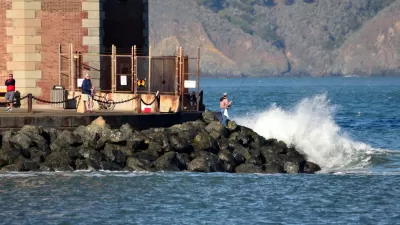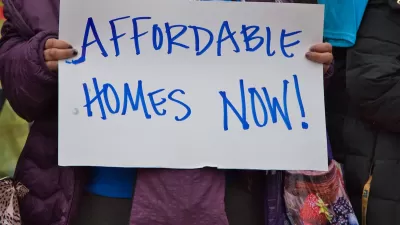Sea level rise is already flooding communities with such regularity that many residents are deciding to leave. The sea level rise tipping point will expand its reach as the climate changes.

"Coastal neighborhoods in several Bay Area cities are likely to face such frequent flooding from rising sea levels over the next century that residents will simply pack up and leave, according to a new study of the effects of climate change," reports Kurtis Alexander.
Those findings are from a report issued earlier this week by the Union of Concerned Scientists [pdf], which is "the first nationwide effort to identify the point at which coastal communities face the no-win decision of having to flee or fight sea level rise."
The report assumes a "point of no return"—when "at least 10 percent of a community experiences flooding 26 days a year, or one day every two weeks," explains Alexander. "Already, more than 90 communities across the nation have hit a point of disruption that’s driving people away […] Eighty more are expected to reach that threshold within 20 years if global warming continues at a moderate rate."
Planetizen shared resources on the issues of "managed retreat" earlier this year, and documented the experience of the Alaskan village of Shishmaref, which voted last year to relocate entirely.
FULL STORY: Scientists expect floods in Bay Area from rising seas in coming decades

Planetizen Federal Action Tracker
A weekly monitor of how Trump’s orders and actions are impacting planners and planning in America.

Maui's Vacation Rental Debate Turns Ugly
Verbal attacks, misinformation campaigns and fistfights plague a high-stakes debate to convert thousands of vacation rentals into long-term housing.

Restaurant Patios Were a Pandemic Win — Why Were They so Hard to Keep?
Social distancing requirements and changes in travel patterns prompted cities to pilot new uses for street and sidewalk space. Then it got complicated.

In California Battle of Housing vs. Environment, Housing Just Won
A new state law significantly limits the power of CEQA, an environmental review law that served as a powerful tool for blocking new development.

Boulder Eliminates Parking Minimums Citywide
Officials estimate the cost of building a single underground parking space at up to $100,000.

Orange County, Florida Adopts Largest US “Sprawl Repair” Code
The ‘Orange Code’ seeks to rectify decades of sprawl-inducing, car-oriented development.
Urban Design for Planners 1: Software Tools
This six-course series explores essential urban design concepts using open source software and equips planners with the tools they need to participate fully in the urban design process.
Planning for Universal Design
Learn the tools for implementing Universal Design in planning regulations.
Heyer Gruel & Associates PA
JM Goldson LLC
Custer County Colorado
City of Camden Redevelopment Agency
City of Astoria
Transportation Research & Education Center (TREC) at Portland State University
Jefferson Parish Government
Camden Redevelopment Agency
City of Claremont




























